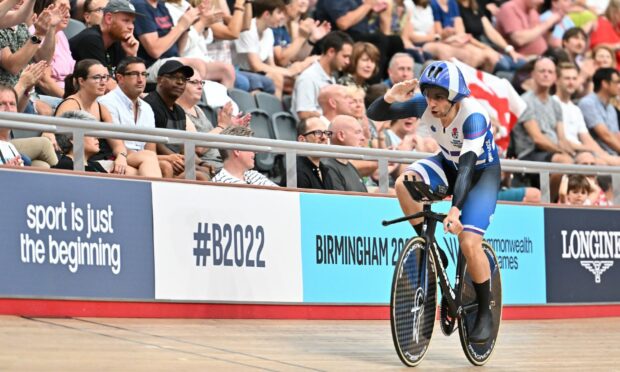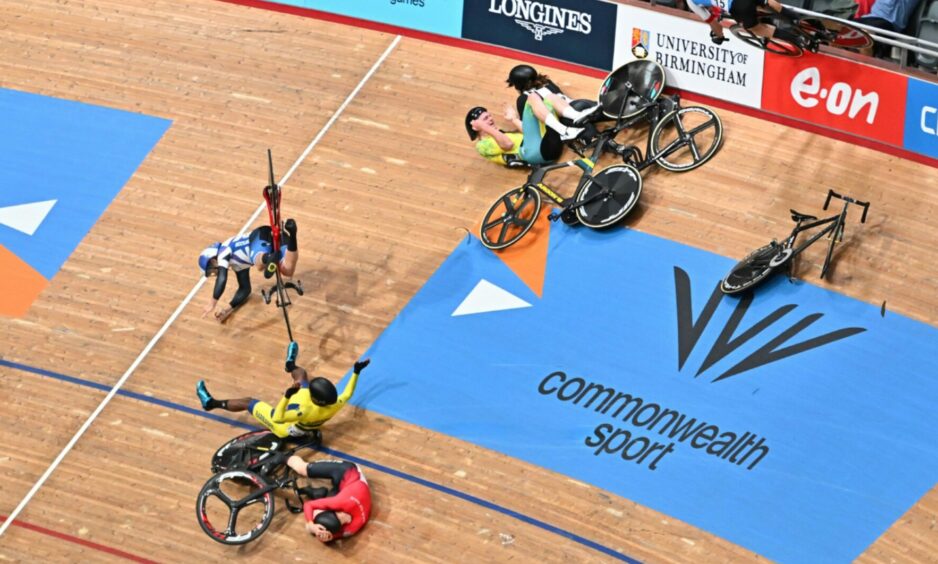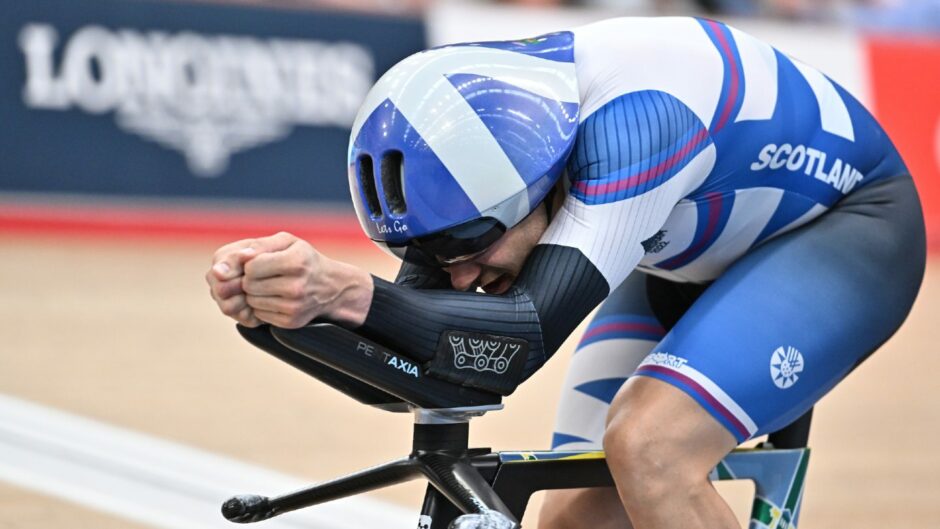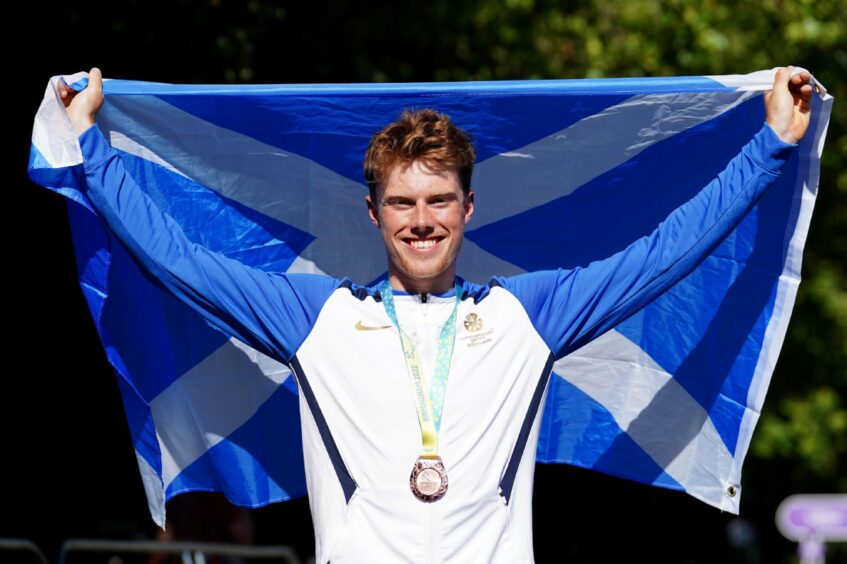Kyle Gordon saw his Commonwealth Games ended in a brutal, unexpected fashion.
The Alness rider was injured in the horrifying velodrome crash on the final day of racing, breaking his collarbone and putting an abrupt full stop at the end of his medal hopes.
Now recovering back home in the Highlands, Gordon says he has been able to process the incident and move on, even if it left a bitter taste after such arduous preparation.
It was three weeks yesterday since he was sent careering into the boards at the Lee Valley VeloPark.
Remarkably he still got back up to finish the points race and after initial thoughts that it was only muscle damage, the prognosis turned out to be much more serious.
‘Chief morale officer’
Gordon had tried to get back on the bike and compete. He was due to ride in the road race and time trial later in the Games but instead, he was reduced to the self-appointed role of “chief morale officer”.
The crash sent England’s Matt Walls hurtling over railings into the crowd, injuring spectators, with Walls, Canada’s Derek Gee and the Isle of Man’s Matt Bostock requiring hospital treatment.
Another Canadian rider, Mathias Guillemette, was disqualified for causing the crash.
“When you’re sliding down the track, it’s kind of in slow-motion,” said Gordon. “You don’t see it on the TV but into the last lap, the Canadian rider (Guillemette) is leading a string of riders out but looking over his shoulder.
“You’re doing 45mph at the time. One flick of the wheel or movement of your body, it’s over-exaggerated and he drifts off the velodrome onto the apron, the big bit of flat concrete between the glass barrier and the track.
“He’s swung back on to the track on the bend and hit the Isle of Man rider then the rider from Barbados. Matt Walls has managed to swerve the crash but because you’re on a 46-degree banking and travelling at that speed, it’s like a ramp and he’s gone straight over.
“It’s a chain reaction, from one guy looking over his shoulder. It’s a big no-no, you just don’t do those sorts of things at that speed or at that stage of the race.
“Your whole body-weight is angled inwards, so if I had managed to correct it at that speed, if I had that kind of reaction time, I could have ended up like Matt Walls in the crowd. The crash happened and I thought ‘I’ve got nowhere to go’.
‘I just wanted to race’
“I came down pretty hard on my right shoulder and it’s taken all the impact.
“It’s split my collarbone like a log; it’s like if you have a carrot and cut it end-to-end, my collarbone is broken that way, rather than the traditional way where the collarbone snaps.
“I jumped back on the bike, finished the race, but the pain got worse and worse. The doctor checked me over and was sure it was muscle damage, because he couldn’t feel any displacement or breaks.
“I went to hospital the next day and got the scan. As the day went on, I was thinking it was still muscle damage and the points race was that night. I was quite keen to do it.
“I went on the bike on the Monday when they opened the session and the doctor, physio and coach were standing trackside to see how I looked on the bike. I was putting on a brave face – I just wanted to race my bike – but it was painful and they could see it.
“I could probably have got through the race by grinding my teeth but was it the best thing to do? We all agreed no as I could end up causing an accident or more harm to myself. About two hours after that we got the results to say it was broken.
“It meant it was the end of the Games and I just had to take it at the time. I was caught up in the environment and hype of it all; it was gutting but I’d had an amazing individual pursuit with a PB, so I was buzzing to come away with that.
“A lot of work went in to getting there and a lot of people supported me to get there. It just shows one thing can change it all. It’s out of your hands and through the fault of another rider.
“I think I’ve processed it all but time will tell.”
Recovering in Inverness
It can be easy to forget that Gordon had already delivered a big result on the track, finishing fifth in the 4000m individual pursuit and narrowly missing out on the medal races.
Gordon was given an initial time-frame of at least four-to-six weeks off the bike, with a sling still required due to the “excruciating” pain in his right shoulder.
He has been able to do minimal work since then and chose to fly straight home to Inverness after the closing ceremony of the Games.
He has been utilising The Oxygen Works in Inverness, a charity which provides oxygen therapy to the Highland community, to help accelerate his recovery.
“A friend, Beth Morrison, used to work at The Oxygen Works and she told me to get in there as soon as possible. It’s a hyperbaric chamber that is pressured to 33 feet below sea level and at the same time, you breathe 90-100% pure oxygen.
“It helps take pressure off joints, or if you’ve got inflammation or broken bones. I would say it’s working – Friday was my third session of the week.
“They are there for any of the public to use and people are using them now for long Covid treatment. We are lucky we’ve got it.”
Pride for fellow Highlander
While Gordon was unable to take further part at the Games, he was still in the thick of the Scottish Cycling camp.
He was filled with pride at seeing fellow Highlander Finn Crockett, who hails from Strathpeffer, take bronze in the men’s road race on the penultimate day of the Games.
“I said to him the night before I had a feeling he was going to get a medal. This is where it starts for him; he’s got the whole package.
“He’s got the personality, he’s a likeable guy, he knows how to train. He’s class. It would be great to see him get on to some bigger teams for next year and get into the bigger races. That’s what he needs.”




Conversation